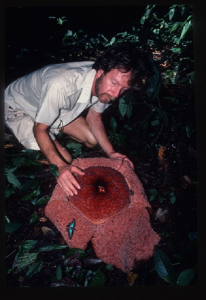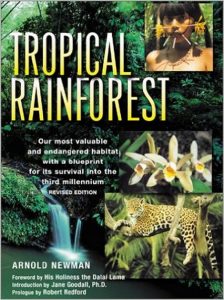Arnold Newman, with a Ph.D. in conservation biology, is the Founder and Executive Director of the International Society for the Preservation of the Tropical Rainforest. For over five decades, he has been an advisor to 80 countries in which tropical rainforests are located, and this work has taken him to all continents where these forests exist.
His book Tropical Rainforests is viewed world over as the lead book on our endangered habitat and its survival for the Third Mi llennium. It is very likely one of the most important books published in our time.
llennium. It is very likely one of the most important books published in our time.
As described in the book, what is a tropical rainforest?
A tropical rainforest is a place in which a consortium of material and climate come together in a perfect combination of temperature and rainfall. The botany takes care of the rest. There must be at least 80 inches of rainfall per year for the environment to form a tropical rainforest, the most life-giving environment on our planet.
As we cut and denude tropical rainforests, there is less evapo-transpiration coming from the leaves, which is responsible for the rainfall nourishing the rest of the mass of the trees and the undergrowth. Ten years of investigations by climatologists have discovered there is less rain falling on Amazonia, which has led to the environment drying out, causing devastating results.
What about our tropical rainforests makes them so important to our planet?
Let me name some of the products that come out of the tropical rainforests. Just look at our breakfast cereals. Rice Krispies come f rom Asian forests; corn flakes come from harvests in South America. Enormous amounts of sugar come from Indian rainforests. Pineapples come largely from Venezuelan rainforests. Hash brown potatoes don’t come from Ireland, but are derived from Andean rainforests. Much of our orange juice comes from Asian forests; tomato juice from Central America; cocoa—not from Switzerland—but from Latin American rainforests. Coffee and tea are grown in Asian and Ethiopian forests. The origin of our beef cattle owes a great deal to the benteng bull, originally found in the Java rainforest.
rom Asian forests; corn flakes come from harvests in South America. Enormous amounts of sugar come from Indian rainforests. Pineapples come largely from Venezuelan rainforests. Hash brown potatoes don’t come from Ireland, but are derived from Andean rainforests. Much of our orange juice comes from Asian forests; tomato juice from Central America; cocoa—not from Switzerland—but from Latin American rainforests. Coffee and tea are grown in Asian and Ethiopian forests. The origin of our beef cattle owes a great deal to the benteng bull, originally found in the Java rainforest.
What about medicinal preparations?
We’ve analyzed only one percent of tropical plants for possible use in medicines. Fifty percent of commonly used medications are derived from plants, and twenty-five percent of prescription drugs are derived from tropical rainforests. The National Cancer Institute recognizes that seventy percent of plants with anti-cancer properties grow only in tropical rainforests. We’ve only analyzed one-percent of those tropical plants for possible use of their alkaloids.
One plant, the rosy periwinkle, produces seventy-five alkaloids—and only two of them have produced vinblastine and vincristine, chemotherapy drugs which bring about a ninety-nine percent remission in acute lymphocytic leukemia, and a high rate of remission in Hodgkin’s Disease. This single plant, with only those two alkaloids, has given us this incredible benefit.
Your book describes some of the threats to our tropical rainforests. Tell us about them.
Imagine rivets popping from an airplane in flight. What’s the tipping point when one more rivet pops and a wing falls of during flight?
We’re creating climate change by deforestation of the tropical rainforests. Tropical deforestation is responsible for nineteen percent of greenhouse gas emissions. If we could prevent half of that deforestation, we would be cutting back more on our emissions than has been done since the issue of climate change was first discussed. We’ve seen how difficult it is to curtail the use of fossil fuels, but it’s far easier to cut back on the denuding of the tropical rainforests.
Currently, we’re very quickly obliterating our tropical rainforests. They’re being decimated because of our planetary birth rate and the consequent demand that places on the use of resources. Humanity gained its one-billionth person in 1835. Presently, we add one billion people every thirteen years.
The second factor in the denuding of the tropical rainforests is the massive industrial complex which excavates the riches of these forests. This primarily involves logging for mahogany and other timber species. Every mahogany tree felled causes seven other trees to die. The sun penetrates to the forest floor and weed species flourish, all transforming the forest into something different from what it had been. The logging roads make easy access for peasants who then farm, using slash and burn techniques which further erode the forests. More and more land is used as the ash from the burned forests makes the land usable for only a few years; consequently, the people move on; cut and burn more forests; and the problem widens. Cattle pastures last for six years, but after that use, the land becomes so degraded nothing else will grow. Even with abundant rainfall, the formerly life-giving land remains barren.
Palm oil and soy bean production are very lucrative businesses. Enormous amounts of money are made by very few people, who often bribe the ministries of agriculture and forest in tropical rainforest countries in order to be allowed to strip the timber and establish massive plantations.
What happens to our planet if we lose more of the rainforests?
Climate change is accelerated by tropical rainforest destruction. Deforestation is now causing superstorms, floods, droughts, hurricanes, tornados, cyclones, and glacial melting all over the world. We’re seeing a rising sea level which is wreaking havoc on island nations like Bangladesh. Because of melting of the Himalayan glaciers, lowland villages are being flooded and destroyed. People are migrating to the capital of Dacca, overwhelming the city. Similar migrations are beginning to occur all over the world, and are part of the problem causing the refugee crisis in the Middle East and in Africa, along with civil wars.
Rising sea levels will impact everyone on this planet.
This not only happens in places like Bangladesh; let’s look at Miami Beach.
It sits on fossil coral, which is porous. Even with water breaks to stop the sea from coming in, seawater seeps in under the walls. It’s moving inland to Miami. One day in the not-too-distant future, there’s going to be an enormously wet wake-up call.
Your book describes steps we can take to ensure the survival of the rainforests. Tell us about them.
Tropical rainforests hold ninety percent of all life forms on earth. It’s our duty to put a stop to their destruction. Each of us is responsible for creating the market for tropical rainforest products. Globally, sixteen million trees are cut each day. If we change the motivation for industries to denude these forests, they’ll find other ways to make their livelihoods.
Twenty years ago, I helped Los Angeles pass into law a provision that tropical hardwoods would no longer be purchased for city benches or be used in city facilities.
We still have a chance to save the forests and our planet. We must maintain pressure on the government. One letter to a representative elicits a form letter from that representative. Three to five letters or emails, elicit personal responses. If a member of congress recognizes there’s a huge constituency concerned about this issue, there will be legislative pressure put to bear for environmental safeguards. We have to demand action on the local, state and federal levels and we have to change some of the ways we live our lives.
Congratulations on writing this important book with its clear explanations, awe-inspiring photographs, and eye-opening diagrams explaining so many issues crucial to our planet’s survival. This book is so important, it has a Foreword written by the Dalai Lama, and an Introduction by Jane Goodall.




